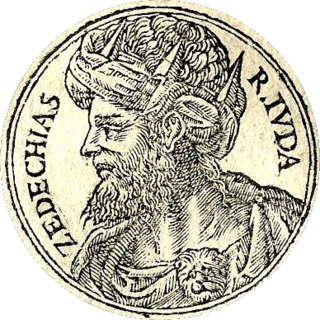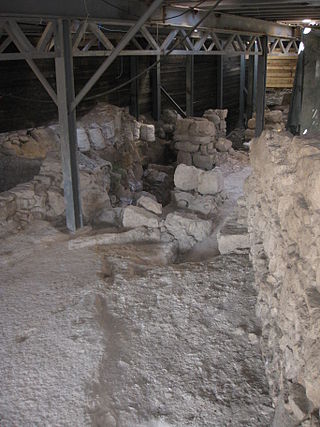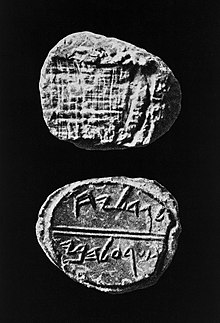
The Kingdom of Judah was a Hebrew-speaking kingdom of the Southern Levant during the Iron Age. Centered in the highlands of Judea, the landlocked kingdom's capital was Jerusalem. Jews are named after Judah and are primarily descended from it.

Zedekiah was the twentieth and final King of Judah before the conquest of the kingdom by Nebuchadnezzar II of Babylon. His birth name was Mattaniah/Mattanyahu.
Pashur or Pashhur was the name of at least two priests contemporary with the prophet Jeremiah and who are mentioned in the Book of Jeremiah. The name is of Egyptian origin, Pš-Ḥr.

Jeremiah, also called Jeremias or the "weeping prophet", was one of the major prophets of the Hebrew Bible. According to Jewish tradition, Jeremiah authored the Book of Jeremiah, the Books of Kings and the Book of Lamentations, with the assistance and under the editorship of Baruch ben Neriah, his scribe and disciple.

According to the Deuteronomistic history in the Hebrew Bible, a United Monarchy or United Kingdom of Israel existed under the reigns of Saul, Eshbaal, David, and Solomon, encompassing the territories of both the later kingdoms of Judah and Israel.
Hilkiah was a Hebrew priest ("Kohen") at the time of King Josiah.

The Large Stone Structure is the name given to a set of remains interpreted by the excavator, Israeli archaeologist Eilat Mazar, as being part of a single large public building in the City of David, presumably the oldest settlement core of Jerusalem. Mazar tentatively dated the findings to the tenth to ninth century BCE. Mazar chose this particular name for the alleged structure because of its proximity to another site known as the Stepped Stone Structure. Mazar announced the discovery on 4 August 2005, and stated that she believed it may be the remains of King David's palace as recorded in the Books of Samuel. The interpretation of the remains as those of one single building, the suggested date, and the association with King David have all been challenged by other well-known archaeologists. The archaeological dig was funded privately by Roger Hertog, an American banker.
Jehucal or Jucal is a Hebrew name referring to a particular person in the Hebrew Bible. Using the biblical source Jeremiah 37:3 he would have lived around the late 7th century to early 6th century BC. The name was also found in Tell Es-Safi and one of the Arad letters.

Eilat Mazar was an Israeli archaeologist. She specialized in Jerusalem and Phoenician archaeology. She was also a key person in Biblical archaeology noted for her discovery of the Large Stone Structure, which she surmised to be the palace of King David.

Shaphan, son of Azaliah, is the name of a scribe or court secretary mentioned several times in the Hebrew Bible.

The siege of Jerusalem was the final event of the Judahite revolts against Babylon, in which Nebuchadnezzar II, king of the Neo-Babylonian Empire, besieged Jerusalem, the capital city of the Kingdom of Judah. Jerusalem fell after a 30-month siege, following which the Babylonians systematically destroyed the city and Solomon's Temple. The Kingdom of Judah was dissolved and many of its inhabitants were exiled to Babylon.
Yehud was a province of the Neo-Babylonian Empire established in the former territories of the Kingdom of Judah, which was destroyed by the Babylonians in the aftermath of the Judahite revolts and the siege of Jerusalem in 587/6 BCE. It first existed as a Jewish administrative division under Gedaliah ben Aḥikam, who was later assassinated by a fellow Jew. The Fast of Gedaliah, a minor fast day in Judaism, was established in memory of this event, and is lamented by observant Jews even to this day.
Jaazaniah or Jezaniah is a biblical Hebrew personal name that appears in the Bible for several different individuals, and has been found on an onyx seal dating from the 6th century BCE.

Jeremiah 39 is the thirty-ninth chapter of the Book of Jeremiah in the Hebrew Bible or the Old Testament of the Christian Bible. It is numbered as Jeremiah 46 in the Septuagint. This book contains prophecies attributed to the prophet Jeremiah, and is one of the Books of the Prophets. This chapter is part of a narrative section consisting of chapters 37 to 44. Chapter 39 records the fall of Jerusalem, verses 1–10, and Jeremiah's fate, verses 11–18.

2 Kings 25 is the twenty-fifth and final chapter of the second part of the Books of Kings in the Hebrew Bible or the Second Book of Kings in the Old Testament of the Christian Bible. The book is a compilation of recorded acts of the kings of Israel and Judah by a Deuteronomic compiler in the seventh century BCE; a supplement was added in the sixth century BCE. This chapter records the events during the reign of Zedekiah, the last king of Judah, the fall of Jerusalem, the governorship of Gedaliah, and the release of Jehoiachin from prison in Babylon.

Jeremiah 21 is the twenty-first chapter of the Book of Jeremiah in the Hebrew Bible or the Old Testament of the Christian Bible. This book contains prophecies attributed to the prophet Jeremiah, and is one of the Books of the Prophets. This chapter contains a record of Jeremiah's message to King Zedekiah's emissaries and a warning to the House of David.

Jeremiah 36 is the thirty-sixth chapter of the Book of Jeremiah in the Hebrew Bible or the Old Testament of the Christian Bible. It is numbered as Jeremiah 43 in the Septuagint. This book contains prophecies attributed to the prophet Jeremiah, and is one of the Books of the Prophets. This chapter records the burning of a scroll of Jeremiah's prophecy by King Jehoiakim and the creation of another scroll by Baruch the scribe, acting on Jeremiah's instructions.

Jeremiah 38 is the thirty-eighth chapter of the Book of Jeremiah in the Hebrew Bible or the Old Testament of the Christian Bible. It is numbered as Jeremiah 45 in the Septuagint. This book contains prophecies attributed to the prophet Jeremiah, and is one of the Books of the Prophets. This chapter is part of a narrative section consisting of chapters 37 to 44. Chapter 38 records the petition from the royal officials to punish Jeremiah, his confinement in the dungeon or cistern and his rescue from there, although he remains in captivity, a secret conversation between Jeremiah and King Zedekiah, and the inquiry of Jeremiah by the king's officials.

2 Kings 22 is the twenty-second chapter of the second part of the Books of Kings in the Hebrew Bible or the Second Book of Kings in the Old Testament of the Christian Bible. The book is a compilation of various annals recording the acts of the kings of Israel and Judah by a Deuteronomic compiler in the seventh century BCE, with a supplement added in the sixth century BCE. This chapter records the events during the reign of Josiah, the king of Judah, especially the discovery of the Book of the Law (Torah) during the renovation of the Temple in Jerusalem.










